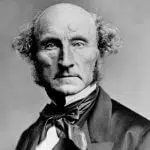 ESSCA Paris, 13 November 2017. A research seminar on “Great Economic Thinkers” – four different papers presented within the framework of an ongoing publication project in the history of economic thought. All actually situated at the periphery of “pure” economics, bringing in ideas from the sociology of innovation, moral philosophy, political ecology. To the non-economist in the audience, it was a stimulating intellectual journey, not without some paradoxes scribbled down in his notebook.
ESSCA Paris, 13 November 2017. A research seminar on “Great Economic Thinkers” – four different papers presented within the framework of an ongoing publication project in the history of economic thought. All actually situated at the periphery of “pure” economics, bringing in ideas from the sociology of innovation, moral philosophy, political ecology. To the non-economist in the audience, it was a stimulating intellectual journey, not without some paradoxes scribbled down in his notebook.
What is an entrepreneur?
Within a rather wide-reaching approach to the work of Joseph Schumpeter – a liberal author who engaged strongly with Marxist approaches – Assen Slim laid particular emphasis on the character of the entrepreneur and the part he/she plays in economic cycles, including the oft-quoted “creative destruction”.
The Schumpeterian entrepreneur is the innovator who is able and willing to change business standards, think out-of-the-box, and find new productive combinations. A person that is ready to accept a high level of personal, professional or financial risk in pursuing opportunity. At the same time, the entrepreneur is characterised by a desire for potency, for seizing challenges, for being confronted with uncertainty and resistance (be it from consumers, bankers, colleagues, or his own family). Like Max Weber’s “charismatic leader”, Schumpeter’s entrepreneur is capable of doing irrational and unpredictable things.
Paradox #1: It is not because Schumpeter saw the entrepreneur as one of the driving forces of capitalism that he did not predict the vanishing of the entrepreneur as a consequence of the inevitable trustification and bureaucratisation of capitalism. And it’s not because he was one of the major scholar of capitalism that he did not underestimate capitalism’s remarkable flexibility.
What is innovation?
Whatever it is in essence, it was in any case the object of a long conceptual discussion between S.C. Gilfillan (1889-1987) and Joseph Schumpeter (1883-1950). Matthieu Ballandonne has dived into the archives of the detailed correspondence between the two scholars over the crucial year 1934-35. What is the difference between invention and innovation? Is innovation simply the economic application of an invention? Is it possible to identify a beginning and an end in an innovation process or is it simply a flow, a cumulative process?
Surprisingly, the research reveals that there is not really an opposition between the two scholars of innovation. The two are, however, separated by a large epistemological divide: in fact, they answer different questions, study different objects, are guided by different disciplinary frameworks of thought.
One of the added values of such archival work – apart from the sheer pleasure of it and the nice extra quotes you can come up with – is the confirmation that regardless of the period under scrutiny, academic debate is clearly influenced by issues of material constraints (Gilfillan was in desperate need of a job), personal vanity, and domination.
Paradox #2: the mere fact that you are a generally acknowledged genius does not mean you are free from the temptation to play the academic power struggle game.
What is liberal socialism?

John Stuart Mill – Public Domain
One of the classical philosophers that influenced Schumpeter was of course John Stuart Mill (1806-1873), whose philosophy of liberalism was at the centre of the contribution by Alain Anquetil. This being said, given Mill’s incredible proficiency and encyclopaedic knowledge, it seems difficult for any economic thinker not to be influenced by him.
Mill is often, somewhat superficially, referred to as a “utilitarian”, in the same vein as Jeremy Bentham. This is not entirely wrong, but his views and doctrines on liberty and equality seem much more relevant in the context of today’s economic globalization. The idea of liberty he develops is firmly grounded in the principles of pluralism and tolerance, and the individual realisation of one’s potential. At first sight, it seems logical that this leads to restricting any kind of state intervention in peoples’ affairs to the prevention of harm from others.
But this is a misleading shortcut! As Alain pointed out, “liberal thinkers do not insist on liberty alone, but always on specific conditions for liberty”. Mill, it appears, was a strong defender of equality. Gender equality to start with, but also social equality, which necessarily implies state intervention in favour of a truly meritocratic society (and, by extension, in favour of redistribution of wealth).
Paradox #3: It is not because you believe in the liberty of the individual as the highest good that you are necessarily insensitive to issues of fairness and equality. In other words: it is not because you are a liberal that you refuse state intervention – quite the opposite!
What is ecological economics?
A very different, almost post-modern, school of thought is represented by the mathematician-turned-economist Nicholas Georgescu-Roegen (1906-1994), whose work was presented by Gabriel Weber.
Georgescu-Roegen is perhaps best known as one of the founding fathers of the philosophy of de-growth, which is based on the understanding of earth as a “closed system” and therefore considered by its disciples as the only solution for humanity’s ecological problems – in other words: of its survival.
The deeply pessimistic assumptions and conclusions of Georgescu-Roegen, his bitter criticism of the homo oeconomicus who is incapable of understanding that the time of humans on earth is running out like in an “hour-glass”, spontaneously provoke contradiction and protests – and did so within the seminar audience, too. For Georgescu-Roegen, man is basically unable and unwilling to identify the most pressing problems, draw science-informed conclusions and take appropriate action. (Any resemblance to current administrations of global superpowers is of course purely accidental.)
His pessimism, as Gabriel pointed out, is profoundly moral: it is a scientifically grounded outcry against “the dictatorship of the present over future generations”. It may also have a “pedagogical virtue” in questioning the blind trust in technological innovation (the reliable “deus ex machina” of mankind who serves as excuse for avoiding behavioural change).
Paradox #4: It is not because your pessimism is depressing that you’re fundamentally wrong.
Conclusion
My takeaway from the seminar (as non-economist attendant): if the book in preparation is half as stimulating and thought-provoking as these presentations were, it will be a good read!




